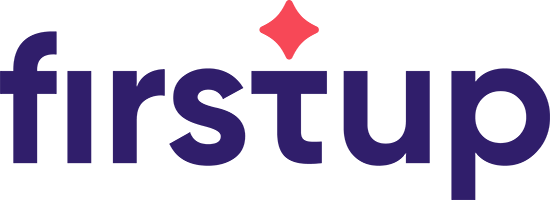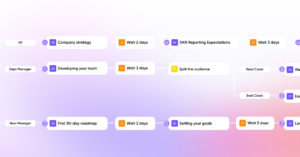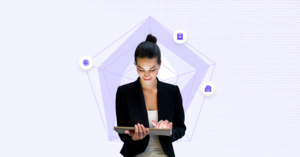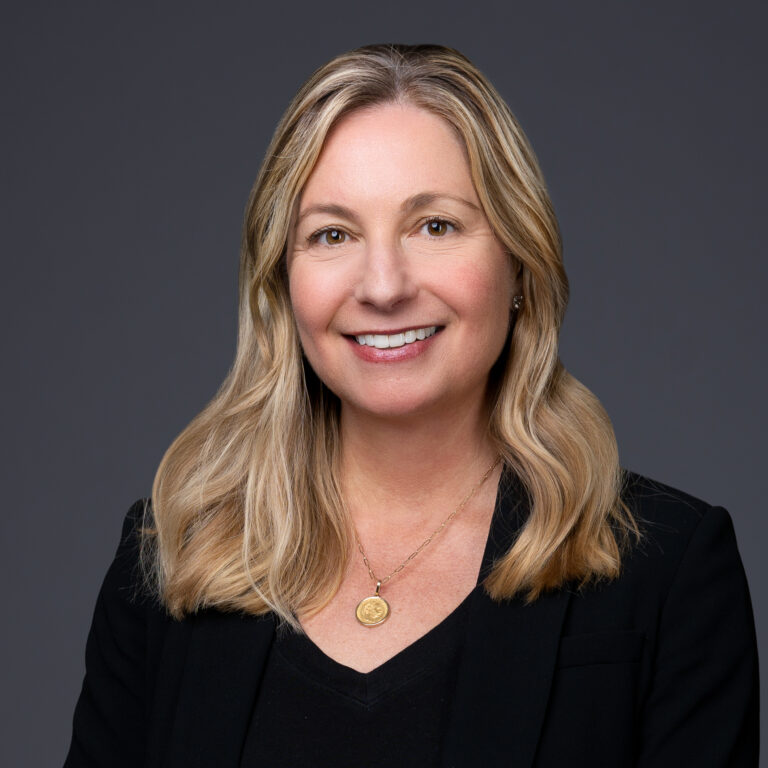Narrator: You cannot have a successful business if you don’t have successful employees. And there’s so much leadership can do to enable and empower workers. That’s what we’re talking about today with Nicole Alvino.
Nicole Alvino: The employee experience is something that every single leader needs to get better at, full stop. It is all about our people and understanding how we can connect them to the purpose of the company, their job, and how they feel a sense of belonging. This is the only way that we move business forward.
Narrator: Nicole is Co-Founder and CEO of Firstup, the world’s first intelligent communication platform. The Firstup platform delivers hyper-personalized communications at every moment along the employee journey for higher productivity and retention. Nicole is also our host for this new season of Cruising Altitude. In this episode, Nicole talks about how the employee experience starts with the pre-hire motion all the way through retirement, how to hyper-personalize it for each employee, and working cross-functionally to deliver a truly exceptional employee experience. But first, let’s hear a word from our sponsor. And now for our interview with Co-Founder and CEO of Firstup, Nicole Alvino. Welcome to Cruising Altitude. I want to say welcome to our new host, Nicole Alvino.
Nicole Alvino: Thanks for having me.
Narrator: So Nicole, I know in this new season, we’re doing a little bit of a switch up and we want to start the interview by having you ask each guest three fun facts about themselves. So let’s start off with three fun facts about you.
Nicole Alvino: Sure. Well, this is something that we do at Firstup to welcome new employees, and it’s a good way to get to know people really quickly, and it’s also interesting to see how people interpret fun facts. So, with that, my first fun fact is that I studied Japanese in college and lived with a Japanese family in Tokyo for my study abroad program. And I learned to do the Japanese tea ceremony, which is an ancient art of making tea. and connecting the dots. My now 12 year old son uses my same bowl and whisk to make matcha. So that is fun fact number one. Fun fact number two is I’ve climbed Kilimanjaro. Which was an incredible experience that I recommend to anyone who has the opportunity. And the third fun fact is that when I was 24 years old, I was given power of attorney by Enron to go to the Cayman Islands to buy a Turkish power plant.
Narrator: Wow, that’s amazing. And it sounds like you’ve done a lot of travel and have some really formative experiences. That sounds incredible. We’d love to hear more about the scope of your role at Firstup. So you co founded and are CEO, is that correct?
Nicole Alvino: Yes, that is right. So as CEO, at our size company, we have about 350 employees. It’s really about making sure that all of our people are aligned to our mission, know what they need to do to help deliver incredible experiences for all of our customers and really move the business forward.
Narrator: Can you tell me about how you came up with the idea for Cruising Altitude? Why did you want to start this podcast?
Nicole Alvino: So I think the cruising altitude piece is interesting for two reasons. One, the employee experience is something that every single leader needs to get better at, full stop. It is all about our people and understanding how we can connect them to the purpose of the company, their job, and how they feel a sense of belonging. This is the Only way that we move business forward. It’s funny. I often say to CEOs, you know, nothing happens in your company without your people and the communication that your people get and receive in order to act. And so this to me is just really bringing that to life and on a much larger scale. The part that’s interesting about cruising altitude and why we named it cruising altitude is thinking about when planes fly, they’re at about 30, 000 feet, that airspace is different. And so we really focus on companies who have at least 30, 000 employees because the challenges for an employee experience and the opportunities, the challenges are greater, the opportunities are greater. And we really wanted to focus on that segment of the workforce, because that’s where. I firmly believe we can have the most transformation.
Narrator: Speaking of challenges, can you share with listeners some of the unique challenges you’re facing as CEO at Firstup?
Nicole Alvino: I think as CEOs, there are always two challenges that you face and it’s really about how we focus on turning those into opportunities. I think the two main pieces are around our people, making sure that we have the very best people in the right positions. to help our company succeed, to help our customers succeed. And then the second piece is on the customer side and being able to engage with the right people at the companies we serve, the companies that are soon to be customers, and really to be able to articulate the value that we can uniquely provide in delivering exceptional employee experiences. I think in this time being an enterprise SaaS company in general, it’s hard. But nothing good ever comes from not hard things. And I think even Bill McDermott just said on his earnings call that this is the new normal and we need to sell value. It’s often selling software to the CEO. so these are all things that we have done at Firstup and we know how to do. So I always think about challenges as opportunities.
Narrator: And, despite all of the challenges, right, you are creating this world class employee experience. And, on that note, can you tell me what are three best practices you’d say that you’ve used to create a great digital employee experience?
Nicole Alvino: Yeah. So we are in the business of selling this. So obviously we use our platform. I’m only slightly joking. We, of course, do use our platform, but I think for anyone who’s looking at how to create an incredible employee experience, three things come up that are fundamental. One is you have to start from the very beginning, so even that pre hire motion, the time when you’re first connecting with that person who’s going to join your company, you have to think of that employee experience from that moment all the way through retire, and really think about all the moments that matter, whether it’s a promotion, whether it’s a personal leave that they need to take, whether it’s a new strategic initiative of the company, it’s M&A, all of these things moments that that matter, moments that matter to them and opportunities to either bring them closer and bring their connection closer to the company or draw them further away. So start at the very beginning. The second piece is to make sure that it’s personalized and I’ve started using the word hyper personalized. If you step back and think about the experiences we have in our personal life, just Think about Amazon. They know us by name. They can reach me. They know when I’m on my mobile phone, when I’m on my desktop, when I’m on my Alexa in the evening in the kitchen with my family, it reaches me where I am. It gives me recommendations based on data, based on my buying preferences, and it guides me through a journey with them. We’ve really taken those types of experiences in the consumer world and brought them to the employee experience. And so back to that personalized aspect, that part is so, so key for anyone designing their digital employee experience, because in my experience, maybe I work on the floor of the Boeing factory, I am driving a truck for Estes or greeting a guest at Hilton, or I’m a seller at Extreme Networks. These are all of our customers, all different employee personas who need different personalized experiences. So, that part is really, really key. And then the third part is to think about the cross functional, participation that you’ll need to deliver on these exceptional employee experiences. We can’t rely everything on the frontline manager. We can’t throw everything on HR. We can’t throw everything on communications or IT. So if we think about starting from the very beginning of the employee journey, really focused on personalization and then making sure that you have the right stakeholders to work together to deliver on the promise of an exceptional employee experience.
Narrator: You mentioned that you’re tuning into data to really follow employees wherever they are, whether it’s mobile, on computer, and so on. So, I’m sure you’re also using data to measure the digital experience. What sort of metrics are you tuning into to really measure that? How do you know you’re doing things right? And how do you craft a great employee experience?
Nicole Alvino: Yeah, those are great questions. And your point, data is key. So everything has to revolve around data. And frankly, this is one of the innovations that we brought to market several years ago, when there really wasn’t measurement or the opportunity to look at how people, especially from employee communications, think about what a CEO needs to to the entire employee base, to certain groups of leaders, even being able to measure and say who has received this communication, who has not. Who has taken action on something? Is there a training to do, a video to watch? Being able to track all of those things is just step one. And then when we have, okay, now we can see where people are engaged. Were they on mobile? And so we can retarget and deliver those right experiences to the right person at the right time. And we’ve found that that which drives the engagement, which therefore drives the outcome that you’re trying to achieve with that type of communication. So that piece is really important and foundational, and something that, like I said, we’re very proud to have brought to the market. And then if you think just like a marketer and think about everything that we need to know as marketers. And be able to look at different types of behaviors, which types of activities is an employee doing? Are they interested in new learning opportunities? Are they looking at other job openings? Are they really interested in DEIB initiatives? Are they interested in leadership? Based on those types of behaviors and their preferences with engagement, we can help deliver them something that really speaks to them and can help guide them in their employee journey that’s relevant to them. Better for them as individuals and ultimately better for the company as well.
Narrator: I’m sure you’ve also learned some of these best practices in crafting this amazing digital employee experience from your own experience. Can you share some of those best experiences you’ve had in your career that come to mind?
Nicole Alvino: Let’s see. My best experiences are always things having to do with people and our customers. So I think when there’s a moment of someone gets promoted, and being able to give them what they need, that the celebration, the recognition and access to additional training and learning to make them the best manager. That’s something that, again, as a leader, I get great pride from, and I know that that’s such an important moment for all types of people. I think another great moment, for our customers and celebrating our customers, at Firstup. I like to say we drink our own champagne, so of course we use our own technology, and we do a lot of recognitions and celebrations around how customers are really getting value from using our platform and use that to share stories. to give kudos to people who helped work with them. And so that to me, that those moments of celebration and recognition, are some of the highlights and things that we really have to recognize in delivering an employee experience that really works for every type of person.
Narrator: I love that. Let’s shift into times in your career where you’ve learned sort of the hard way, lessons learned. I know you mentioned you worked for Enron, so maybe that can Play a part here, but what would you say is the biggest employee experience lesson you’ve learned from your career?
Nicole Alvino: Probably the biggest one is about leader transparency, and authenticity. At Enron, I got the opposite of that. Obviously there were severe ethical challenges, but as someone in my 20s, it was a very formative point in my career. I really looked up to our leaders and wanted to learn from them, and then when they were, talking to us, and not only not being transparent, but not being truthful, that was something that, that really took a toll on me personally of understanding how can leaders who need to look out for their employees in addition to shareholders, treat this in this way, and so that’s something that, I’m so proud at First Step, we have leaders of CEOs of some of the largest companies in the world, Boeing and MGM and Ford and Amazon, who use our platform to communicate directly and especially to the, the front line, and really have that moment of not only transparency, but authenticity. Some even enable a two way conversation, which is incredible and a testament to, you know, I think that that wouldn’t have happened 20 years ago at an Enron, but definitely what I’m so proud that we’ve helped bring to market and we’ll continue to push the envelope there.
Narrator: I’m sure you’ve experienced times where it’s been just really hard as a leader. So, let’s talk about how you lead during times of change or difficulty. What’s important then?
Nicole Alvino: Think with any time of difficulty, crisis, change, there are two things that I always do. It’s lead with transparency and empathy. I think you have to be incredibly transparent, um, with clear communication so people know what A is going on, what you expect of them as a leader and then how you will continue to support them throughout this difficult change. so that piece with, with obviously communication at the core is so important and the empathy goes hand in hand. So in times of any change, people are, of course, feeling uncertain, and so I think it’s, the best leaders are able to, connect in a way to really understand what that individual is going through and to help, Assure them if they have any fears or to address any specific questions so we can deal with whatever crisis or whatever change is at hand. Another thing I’ve learned is some people in any type of change, there’s, you know, you think about the change curve. Sometimes there can be excitement and we can have fear. And anguish and exhaustion before we get out to kind of what’s possible on the other side. In having experienced M& A and some, some other organizational transformations, I’ve seen some people who just deal with change a lot faster, get through the curve and others just need a little more time. And so I think it’s important to be transparent and meet people where they are to make sure that we can help them get through that change curve, quickly as possible for the individual as well as the company.
Narrator: And leading through those times of difficulty or change, like you mentioned, you have to have a really strong mindset. When we talk about 30, 000 feet, having 30, 000 employees, at 30, 000 feet, right, you have this heightened sense of clarity and perspective. So what is your place of extreme clarity and heightened perspective? Where do you do your best thinking?
Nicole Alvino: In planes, I do a lot of traveling and I actually, this is why I kind of love cruising altitude. I do my best thinking when I’m on a plane. I do love the window seat. So I look out and there is a different clarity and perspective at 30, 000 feet. And so I find that that also is some quiet time. It’s a great deep thinking time for me. And it is time where I can work through some potentially challenging things I’m working with, or really need to be creative and can get some great thinking done at, 30, 000 feet.
Narrator: Can you share a time that you were at 30, 000 feet and you had sort of an aha moment or, sudden clarity or, you found, you found perspective that helped you achieve, something you never thought possible before?
Nicole Alvino: Yeah. So I’m always trying to think about how to provide the most value and an exceptional experience for all of our customers, as well as our employees. So when, usually when I am. Leaving a set of meetings and coming home or coming to a new city, that’s where I synthesize notes and what happened in a meeting, looking at some gone transcripts. And so for me, those are the moments when I can piece things together, especially if I’ve heard something similar that different customers had shared. And can really synthesize that and drive it to action and get some of the other folks, whether it’s something that we can put on our product roadmap, something we can elevate with, a better go to market offering. And those are the moments where it all really comes together.
Narrator: And lastly, so our listeners can take some of your wisdom with them, let’s end with the ones. In other words, one thing you never do and one thing you always do.
Nicole Alvino: Okay, so these are important. I always tell the truth. I think integrity is non negotiable, especially from experiences in early days of my career at Enron. And especially as a leader, both for our industry, customers, our people, that is a non negotiable for me. One thing I never do is stop learning. I think we all always have more to grow and evolve and learn. I love Growth Mindset, the book Mindset by Carol DeWitt. And I actually send that book to all of our new hires. Part of that, when we deliver an employee experience, we. Send a welcome box to folks who join. And that is one of the things in the box. Because I lead with a growth mindset, at the front.
Narrator: And for listeners who want to connect with you, Nicole, where can they find you? Where can they connect with you?
Nicole Alvino: You can connect with me on LinkedIn, Nicole Alvino, and, via email Nicole at firstup.io, look forward to chatting with everyone.
Narrator: Wonderful. And thank you for tuning in to Cruising Altitude. We will catch you next time. Thank you for listening to this episode of Cruising Altitude. This episode is brought to you by FirstUp, the company that is redefining the digital employee experience to put people first and the companies up by connecting every worker everywhere with the information that helps them do their best work. FirstUp has helped over 40 percent of the Fortune 100 companies like Amazon, AB InBev, Ford, and Pfizer stay agile and keep transforming. Learn more at firstup. io







